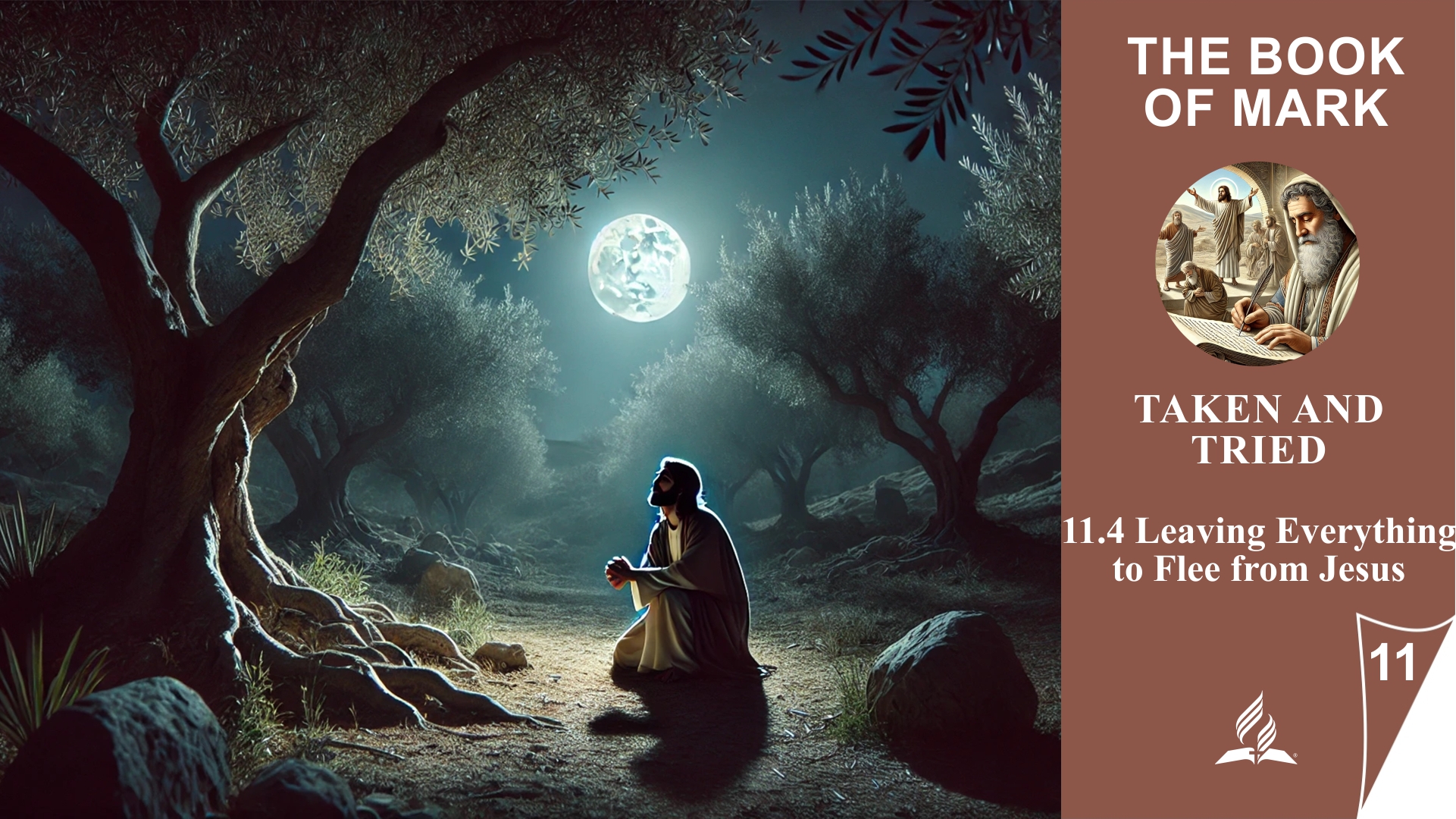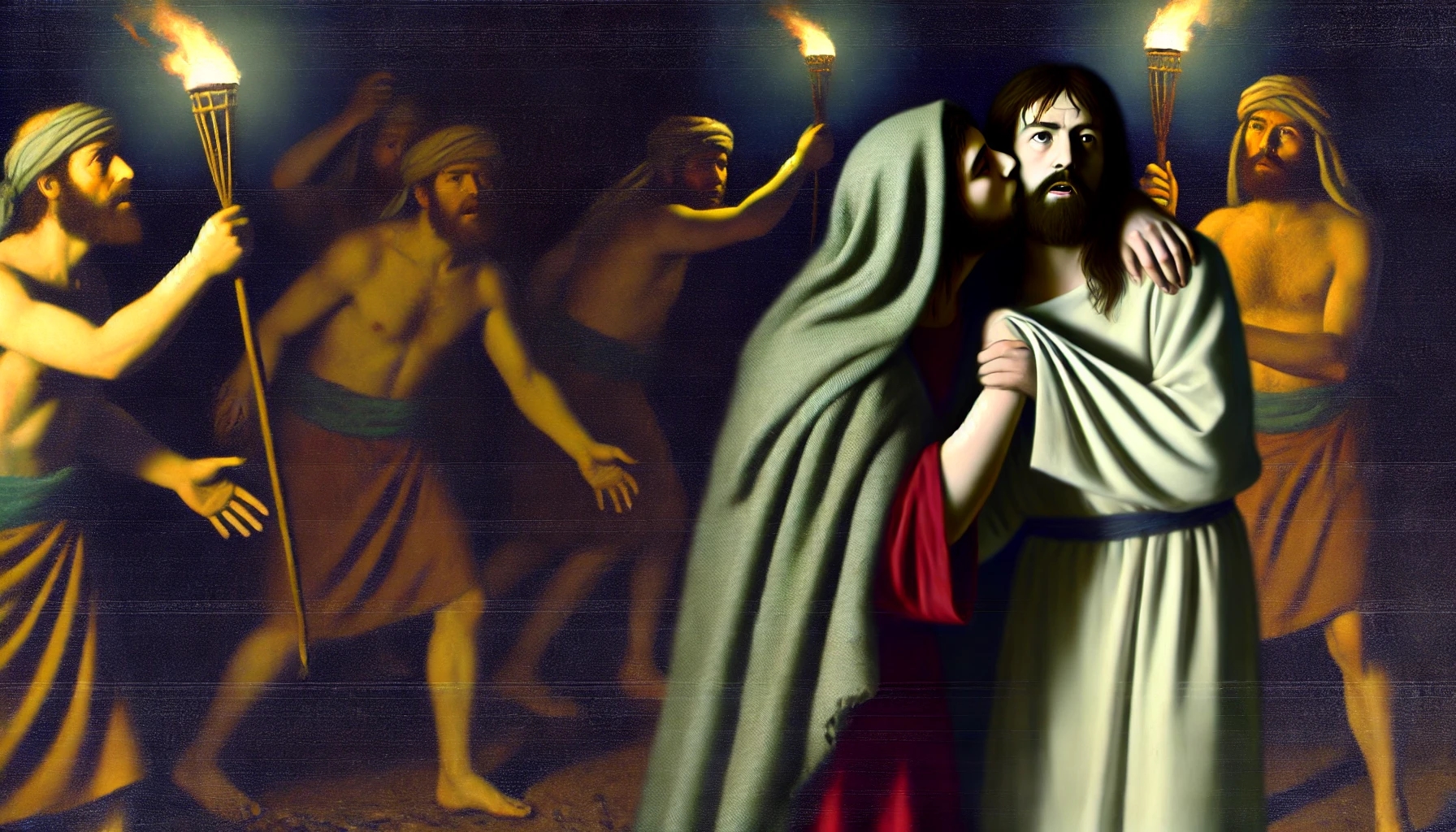


11.4 Leaving Everything to Flee from Jesus
Betrayal and Flight: The Fulfillment of the Divine Plan Despite Human Weakness
Read Mark 14:43-52. What happens here that is crucial to the plan of salvation?
In Mark 14:43-52, we witness a pivotal moment in the Passion story: the arrest of Jesus and Judas’ betrayal. This passage reveals the tragedy of human betrayal and the power of God’s redemptive plan. Judas, one of Jesus’ closest confidants, betrays him, showing the profound power of sin that can take root in a person’s heart. Judas, who had walked alongside Jesus as a disciple, eventually became overwhelmed by his greed for money, which Ellen White describes as a gradually growing corruption that surpassed his love for Christ.
What makes Judas’ betrayal particularly significant is the manner in which he does it—under the guise of friendship. The kiss, a traditional sign of love and affection, becomes here a symbol of treachery. This hypocrisy intensifies the shame of Judas’ act, as he pretends to be a friend while simultaneously handing Jesus over to be arrested. The kiss becomes a symbol of outwardly appearing good while hiding evil intentions within.
As Jesus is arrested, chaos ensues. Peter, identified in John 18:10-11, attempts to intervene violently by cutting off the ear of the high priest’s servant. However, Jesus, recognizing the divine plan, rebukes this act of violence and reiterates that everything is unfolding as Scripture predicted. In Jesus’ response, we see that God’s will—the salvation of humanity—remains at the center, even as human failures and sins attempt to derail it.
An important aspect of this scene is the disciples’ behavior. After following Jesus for so long, they now flee in panic. This symbolizes the human tendency to protect oneself in moments of danger and uncertainty rather than maintaining faith and loyalty to Christ. The flight also highlights the fragility of the human spirit, even among those closest to Jesus.
Particularly noteworthy is the account of the young man mentioned in verses 51-52. While his identity remains unclear, some believe he could be Mark himself. What stands out is the symbolic act of “fleeing.” The young man leaves everything behind to run away, serving as a metaphor for the universal human tendency to flee from God’s presence when the path becomes difficult. His flight, even leaving his clothes behind, represents naked fear and total abandonment.
This passage is crucial to the plan of salvation, as it shows that God’s will, despite human weakness and sin, remains unstoppable. The disciples’ flight and Peter’s violence cannot hinder the fulfillment of God’s plan. Jesus’ commitment to his Father’s will remains unwavering amid the chaos.
Summary:
Mark 14:43-52 describes the betrayal of Jesus, his arrest, and the flight of his disciples. Judas’ act, under the pretense of friendship, and the despair of the disciples reflect human weakness. Yet, God’s redemptive plan remains intact. While people flee in fear, the fulfillment of God’s plan for salvation is made clear through Jesus’ steadfast obedience to the Father.
Reflect on the frightening thought that Judas, enslaved by a single vice, did what he did. What does this teach us about hating sin and overcoming it through God’s grace?
The thought that Judas, one of Jesus’ closest disciples, was capable of such a terrible betrayal because he was enslaved by a single vice—his greed for money—is truly alarming. It shows us the destructive power that sin can have over a person’s life if it is not controlled or overcome. Judas did not start as a traitor, but his continual indulgence in his greed, without resisting it, eventually led him to become completely enslaved by this sin.
This understanding should lead us to hate sin in all its forms and take it seriously, even when it seems small or insignificant at first. Any unchecked sin can gradually harden our hearts and pull us away from God. Like Judas, we risk letting a “small” weakness completely take over and lead to even greater sins that harm not only ourselves but also others.
Through God’s grace and power, it is possible to overcome any sin, no matter how deeply rooted it may seem. Judas also had the chance to repent of his sin and seek forgiveness, but he chose not to. We are reminded of how important it is to remain vigilant, regularly examine our hearts, and immediately repent when we recognize that we are on a dangerous path.
In our relationship with God, through prayer and by the Holy Spirit, we have the means to resist temptation and break the hold of sin in our lives. Every day, we should strive to receive God’s grace so we can stay free from the chains of sin and walk in His holiness.
The events of Judas’ betrayal and the disciples’ flight in Mark 14:43-52 have a deep connection to our daily lives and faith. They remind us of how quickly, in moments of fear and uncertainty, people can lose their closeness to God. This story shows us the fragility of human nature, even among those closest to Jesus. The disciples, who had followed Jesus, fled in panic when the situation became dangerous, thereby betraying their loyalty and faith.
In our daily lives, we also face moments where uncertainties, difficulties, or temptations lead us to distance ourselves from God. It is easy, during trials or fear, to fall back into old habits or lose faith in God’s plan. However, the disciples’ flight and Judas’ actions serve as a reminder of how important it is to remain firm in faith, even in challenging situations.
Judas’ betrayal, motivated by a single vice—his greed—shows us how dangerous it is to tolerate unchecked sin in our lives. What begins small can gradually take control of us and endanger our relationship with God. This realization should encourage us to stay vigilant toward our weaknesses and regularly repent when we recognize we are on the wrong path.
In our faith journey, we must rely daily on God’s grace to overcome sin’s influence. Through prayer, dedication, and the power of the Holy Spirit, we can resist temptations and maintain our loyalty to Christ, even in the most difficult trials.
Trust in God’s grace, for even in moments of weakness, it leads us back to the path of faith.
(Visited 35 times, 1 visits today)






















